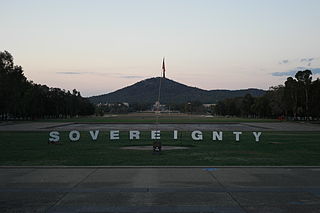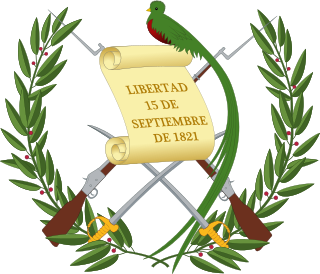
The Constitution of Canada is the supreme law in Canada. It outlines Canada's system of government and the civil and human rights of those who are citizens of Canada and non-citizens in Canada. Its contents are an amalgamation of various codified acts, treaties between the Crown and Indigenous Peoples, uncodified traditions and conventions. Canada is one of the oldest constitutional monarchies in the world.
Sovereign immunity, or crown immunity, is a legal doctrine whereby a sovereign or state cannot commit a legal wrong and is immune from civil suit or criminal prosecution, strictly speaking in modern texts in its own courts. State immunity is a similar, stronger doctrine, that applies to foreign courts.

The legal system of Canada is pluralist: its foundations lie in the English common law system, the French civil law system, and Indigenous law systems developed by the various Indigenous Nations.

The Autonomous Region in Muslim Mindanao was an autonomous region of the Philippines, located in the Mindanao island group of the Philippines, that consisted of five predominantly Muslim provinces: Basilan, Lanao del Sur, Maguindanao, Sulu, and Tawi-Tawi. It was the only region that had its own government. The region's de facto seat of government was Cotabato City, although this self-governing city was outside its jurisdiction.

Tribal sovereignty in the United States is the concept of the inherent authority of Indigenous tribes to govern themselves within the borders of the United States.

Australian Indigenous sovereignty, also recently termed Blak sovereignty, encompasses the various rights claimed by Aboriginal and Torres Strait Islander peoples within Australia. Such rights are said to derive from Indigenous peoples' occupation and ownership of Australia prior to colonisation and through their continuing spiritual connection to land. Indigenous sovereignty is not recognised in the Australian Constitution or under Australian law.
Section 35 of the Constitution Act, 1982 provides constitutional protection to the indigenous and treaty rights of indigenous peoples in Canada. The section, while within the Constitution of Canada, falls outside the Canadian Charter of Rights and Freedoms. The section does not define the term "aboriginal rights" or provide a closed list; some examples of the rights that section 35 has been found to protect are fishing, logging, hunting, the right to land and the right to enforcement of treaties. There remains a debate over whether the right to indigenous self-government is included within section 35. As of 2006 the Supreme Court of Canada has made no ruling on the matter. However, since 1995 the Government of Canada has had a policy recognizing the inherent right of self-government under section 35.

The constitution of New Zealand is the sum of laws and principles that determine the political governance of New Zealand. Unlike many other nations, New Zealand has no single constitutional document. It is an uncodified constitution, sometimes referred to as an "unwritten constitution", although the New Zealand constitution is in fact an amalgamation of written and unwritten sources. The Constitution Act 1986 has a central role, alongside a collection of other statutes, orders in Council, letters patent, decisions of the courts, principles of the Treaty of Waitangi, and unwritten traditions and conventions. There is no technical difference between ordinary statutes and law considered "constitutional law"; no law is accorded higher status. In most cases the New Zealand Parliament can perform "constitutional reform" simply by passing acts of Parliament, and thus has the power to change or abolish elements of the constitution. There are some exceptions to this though – the Electoral Act 1993 requires certain provisions can only be amended following a referendum.

Canadian Aboriginal law is the body of law of Canada that concerns a variety of issues related to Indigenous peoples in Canada. Canadian Aboriginal Law is different from Canadian Indigenous law: In Canada, Indigenous Law refers to the legal traditions, customs, and practices of Indigenous peoples and groups. Aboriginal peoples as a collective noun is a specific term of art used in legal documents, including the Constitution Act, 1982, and includes First Nations, Inuit and Métis people. Canadian Aboriginal law provides certain constitutionally recognized rights to land and traditional practices. Canadian Aboriginal Law enforces and interprets certain treaties between the Crown and Indigenous people, and manages much of their interaction. A major area of Aboriginal law involves the duty to consult and accommodate.
The association between the monarchy of Canada and Indigenous peoples in Canada stretches back to the first interactions between North American Indigenous peoples and European colonialists and, over centuries of interface, treaties were established concerning the monarch and Indigenous nations. First Nations, Inuit, and Métis peoples in Canada have a unique relationship with the reigning monarch and, like the Māori and the Treaty of Waitangi in New Zealand, generally view the affiliation as being not between them and the ever-changing Cabinet, but instead with the continuous Crown of Canada, as embodied in the reigning sovereign.
In Australia, Canada, New Zealand and the United States the term treaty rights specifically refers to rights for indigenous peoples enumerated in treaties with settler societies that arose from European colonization.

The Constitution of Guatemala is the supreme law of the Republic of Guatemala. It sets the bases for the organization of Guatemalan government and it outlines the three main branches of Guatemalan government: executive branch, legislative branch, and judicial branch.
The Constitution of the Philippines is the constitution or the supreme law of the Republic of the Philippines. Its final draft was completed by the Constitutional Commission on October 12, 1986, and ratified by a nationwide plebiscite on February 2, 1987.

The sovereignty of Canada is, in legal terms, the power of Canada to govern itself and its subjects; it is the ultimate source of Canada's law and order. Sovereignty is also a major cultural matter in Canada. Several matters currently define Canadian sovereignty: the Canadian monarchy, telecommunication, the autonomy of the provinces, and Canada's Arctic border.
Violence against women in the Philippines includes different forms of gender-based violence. The term "violence against women" is "the word or concept (that) has been used in a broad, inclusive manner to encompass verbal abuse, intimidation, physical harassment, homicide, sexual assault, and rape." This form of violence is gender-biased. Violence occurs precisely because of their gender, specifically because the victims are women.

The Indigenous Peoples' Rights Act of 1997 (IPRA), officially designated as Republic Act No. 8371, is a Philippine law that recognizes and promotes the rights of indigenous cultural communities and Indigenous peoples in the Philippines.
Land reform in the Philippines has long been a contentious issue rooted in the Philippines's Spanish Colonial Period. Some efforts began during the American Colonial Period with renewed efforts during the Commonwealth, following independence, during Martial Law and especially following the People Power Revolution in 1986. The current law, the Comprehensive Agrarian Reform Program, was passed following the revolution and extended until 2014.
Ancestral domain or ancestral lands are the lands, territories and resources of indigenous peoples, particularly in the Asia-Pacific region. The term differs from indigenous land rights, Aboriginal title or Native Title by directly indicating relationship to land based on ancestry, while domain indicates relationships beyond material lands and territories, including spiritual and cultural aspects that may not be acknowledged in land titles and legal doctrine about trading ownership.
Indigenous or Aboriginal self-government refers to proposals to give governments representing the Indigenous peoples in Canada greater powers of government. These proposals range from giving Aboriginal governments powers similar to that of local governments in Canada to demands that Indigenous governments be recognized as sovereign, and capable of "nation-to-nation" negotiations as legal equals to the Crown, as well as many other variations.
The Baguio City Council is Baguio's Sangguniang Panlungsod or legislative body. The council has 15 members which is composed of 12 councilors, one ex officio member elected from the ranks of barangay (neighborhood) chairmen, one ex officio member elected from the ranks of Sangguniang Kabataan chairmen and one presiding officer. The Vice-mayor of the city is the presiding officer of the council, who is elected citywide.








